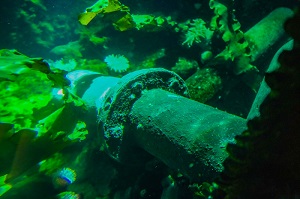Finland Says Gas Pipeline Likely Broken by Ship Dragging Anchor
(Reuters) — Damage to a Baltic Sea gas pipeline earlier this month is believed to have been caused by a ship dragging a large anchor along the seabed, but it was too early to tell if this was an accident or a deliberate act, Finnish police said on Tuesday.
Investigators said they had now retrieved a lost anchor from the seabed location where the pipeline ruptured on Oct. 8, and were investigating whether it belonged to a Chinese container vessel.
Police have previously said damage to the Balticconnector subsea gas pipeline and two Baltic Sea telecoms cables was caused by external mechanical force and were investigating whether this was a case of sabotage or caused by accident.
Broad drag marks were seen on the seabed leading up to where the pipeline was broken, and the anchor was lying immediately after the damage spot. A narrower path was seen on the seabed stretching onwards for dozens of miles, police said.
A piece of the anchor, one of its two spikes, had broken off, they added.
"The next questions are about whether it was intentional, negligence, poor seamanship, and that's where we get into whether there could be a motive for what's going on," National Bureau of Investigation (NBI) chief Robin Lardot told a press conference.
"But it's too early to answer that at this stage," he added.
The NBI on Friday said they were focusing their probe on the Chinese NewNew Polar Bear container vessel that had travelled above the pipeline and the cables at the time of the damage.
The NBI on Tuesday said they had established that the NewNew Polar Bear was in fact missing one of its front anchors and said they had tried unsuccessfully to contact the ship to ask whether this was the one retrieved in the Gulf of Finland.
China called on Monday for an "objective, fair and professional" investigation into the pipeline damage.
The incident cut pipeline gas supplies to Finland, although the country expects to manage with imports of liquefied natural gas via ship deliveries to its Inkoo port.
As a result of the damage, NATO has stepped up patrols in the Baltic Sea.
In September 2022, the larger Nord Stream pipelines connecting Germany and Russia were damaged by explosions that authorities have said were deliberate acts of sabotage, although it is still unclear who was behind the attack.
Related News
Related News

- Keystone Oil Pipeline Resumes Operations After Temporary Shutdown
- Freeport LNG Plant Runs Near Zero Consumption for Fifth Day
- Biden Administration Buys Oil for Emergency Reserve Above Target Price
- Mexico Seizes Air Liquide's Hydrogen Plant at Pemex Refinery
- Enbridge to Invest $500 Million in Pipeline Assets, Including Expansion of 850-Mile Gray Oak Pipeline





Comments